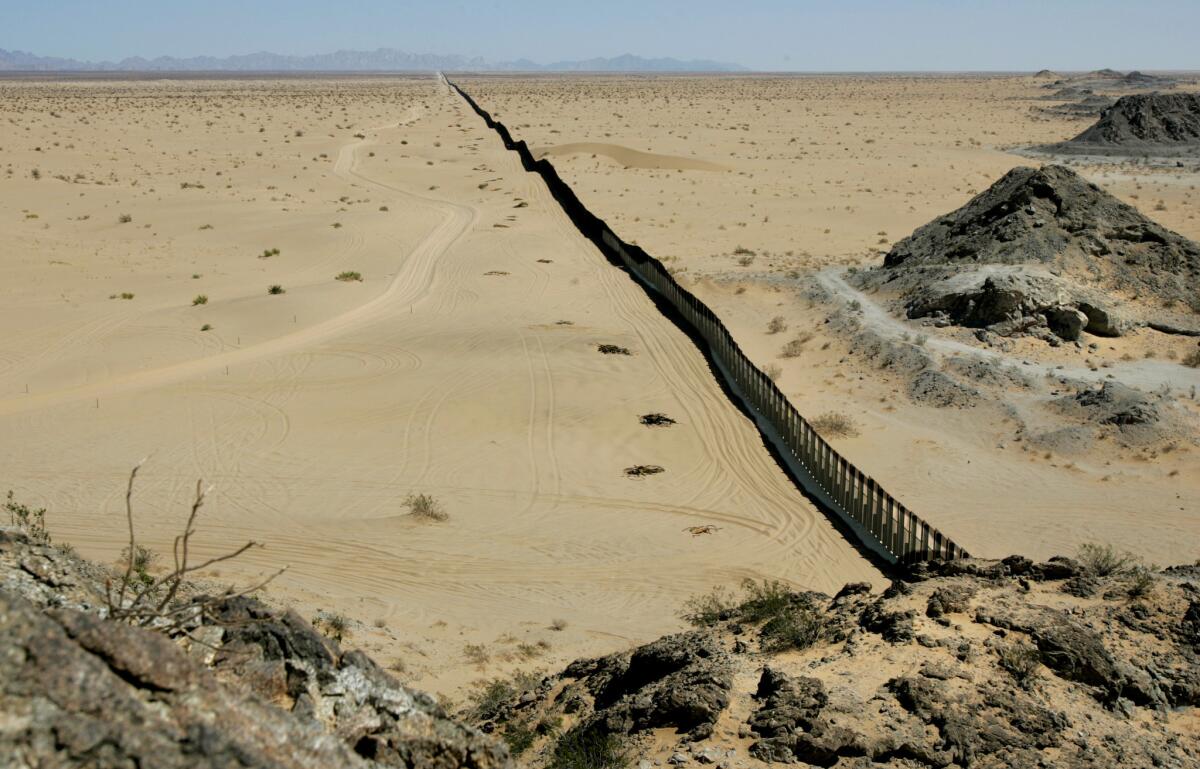A court slams the brakes on Trump’s efforts to charge border crossers as criminals

- Share via
In a little noted ruling, the U.S. 9th Circuit Court of Appeals on Wednesday knocked the legs out from beneath the Trump administration’s policy of charging migrants who cross the border illegally with criminal acts. And, interestingly, the heart of the decision hinges on what it means to “elude” border inspections.
It’s unclear how many federal cases ultimately might be affected, or whether the ruling will survive the all-but-guaranteed appeal by the government. But if it holds, the Justice Department will face some serious hurdles in continuing to charge many migrants with illegal entry into the country, a criminal rather than a civil immigration infraction.
It was just such arrests that the administration used to separate migrant families. Under then-Atty. Gen. Jeff Sessions’ “zero tolerance” policy, parents were charged with misdemeanor counts of illegally entering the country and taken to jail to await court proceedings, which triggered the process under which their children — who under law could not join them in jail — were trundled off to detention centers and, in many cases, foster care. Hundreds of parents were deported without their children.
That remains one of the darkest chapters in this current reign of darkness, a policy so vile that President Trump himself (albeit after intense pressure from family and allies) had trouble stomaching it and ordered it ended.
The ruling comes in the case of a Mexican man named Oracio Corrales-Vazquez, who slipped across the border last year about 20 miles east of Tecate, Mexico, and was apprehended by border agents as he hid in bushes about four miles north of the border. He was charged with “elud[ing] examination or inspection by immigration officers” under Section 1325 of the U.S. code, the law that several Democratic presidential candidates say they would seek to repeal if elected.

That law has three components, declaring that “any alien who (1) enters or attempts to enter the United States at any time or place other than as designated by immigration officers, or (2) eludes examination or inspection by immigration officers, or (3) attempts to enter or obtains entry to the United States by a willfully false or misleading representation or the willful concealment of a material fact, shall” be guilty of a misdemeanor.
Corrales was convicted under that second element but argued in his appeal that the wording of the law means that it can only apply to people trying to sneak into the country at guarded ports of entry. Walking across an unguarded part of the border might amount to avoiding detection, but it’s not eluding because there is no one there to elude.
Two of the three judges on the 9th Circuit panel agreed.
Writing for the majority, Judge Jay Bybee (a George W. Bush appointee) said that Congress clearly envisioned separate scenarios in writing the law the way it did.
“Section 1325(a)(1) covers aliens who enter or attempt to enter outside of an open port of entry,” Bybee wrote. “Section 1325(a)(2) covers aliens who cross through an open port of entry, but elude examination or inspection in doing so. And § 1325(a)(3) covers aliens who cross through an open port of entry and submit to examination and inspection, but obtain entry (or attempt to obtain entry) through willful misrepresentation or concealment. The statute works as a seamless whole.”
Since Corrales’ entry to the country was between ports of entry, he might have been guilty of the first section, but the government didn’t charge him with that.
Why not? Because the court had previously ruled that the first part of the law does not apply to people who cross under surveillance, especially those who then seek asylum, since they aren’t trying to avoid detection and are entering the country under a legal umbrella of restraint (yes, it’s arcane).
So the government began charging people under the second element of the law, which the court now says it no longer can do.
It’s a mess, to be sure, which Bybee noted in his concurring opinion to his majority decision (how often does that happen?), describing the court’s decisions on that portion of immigration law as a “doctrinal minefield.” The judge concluded that the courts should “clean up our own mess under § 1325(a)(1) at the first opportunity.”
Amen.
More to Read
A cure for the common opinion
Get thought-provoking perspectives with our weekly newsletter.
You may occasionally receive promotional content from the Los Angeles Times.










